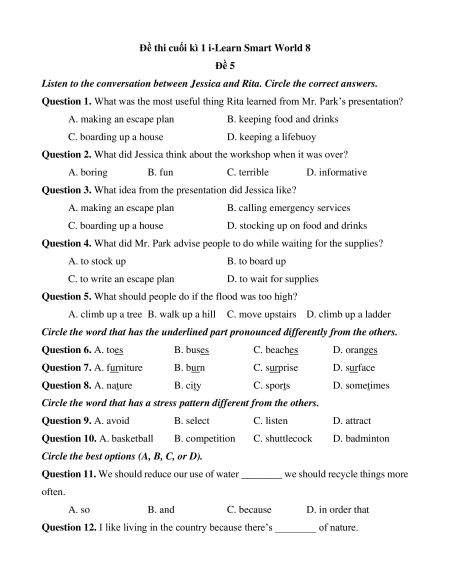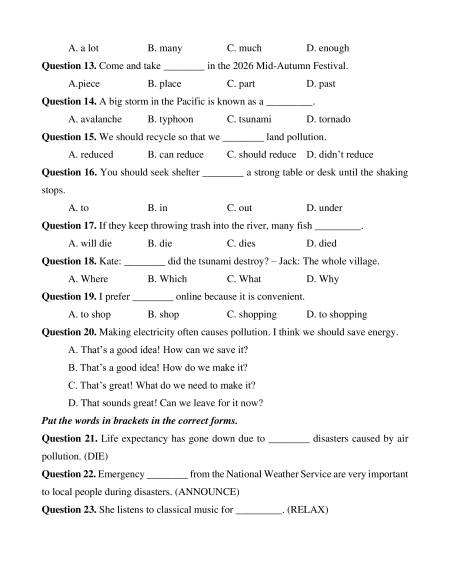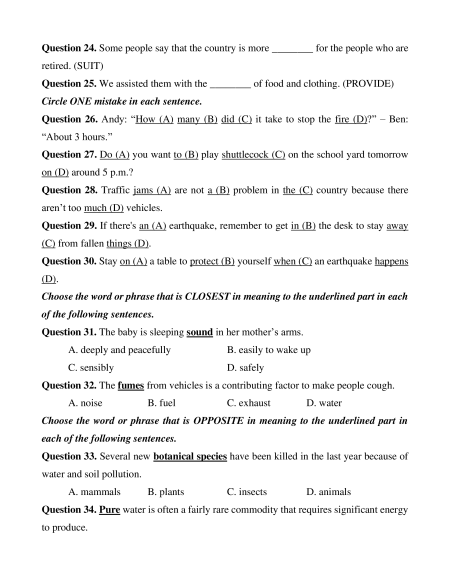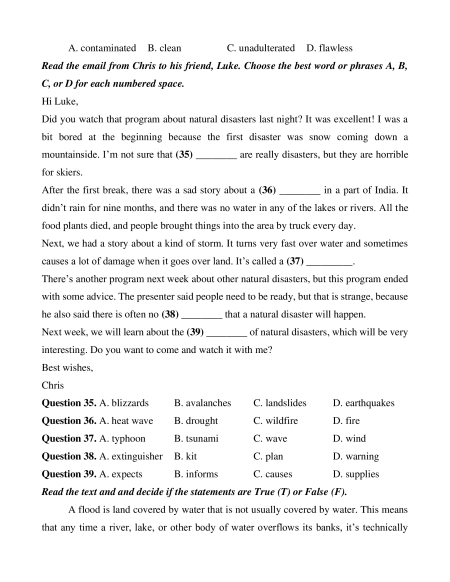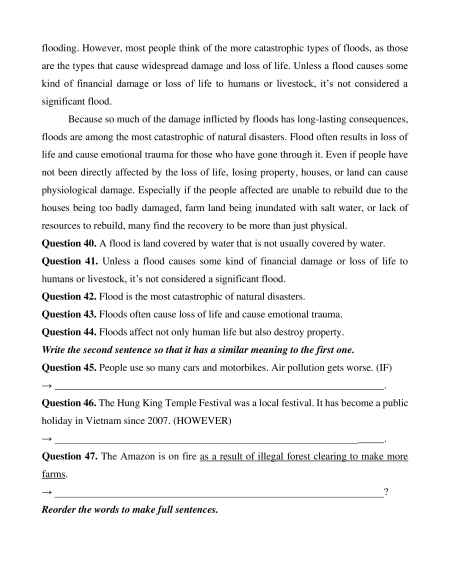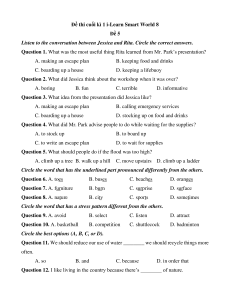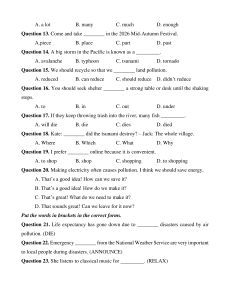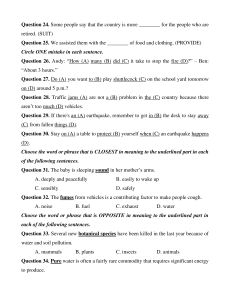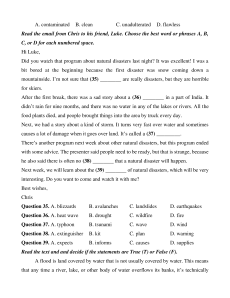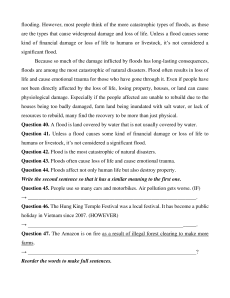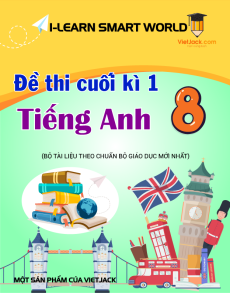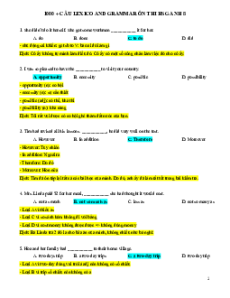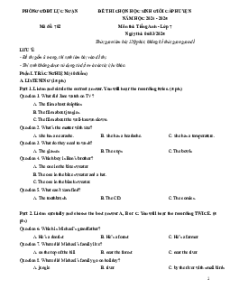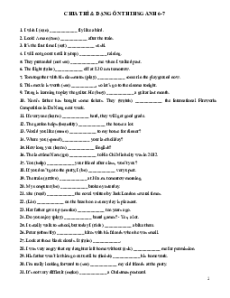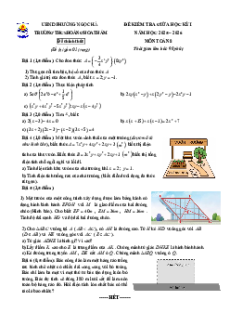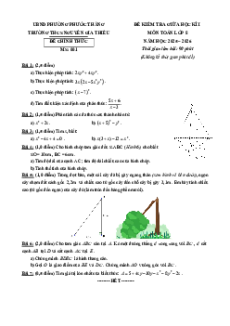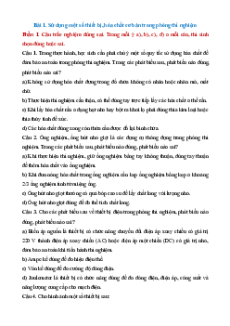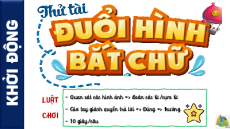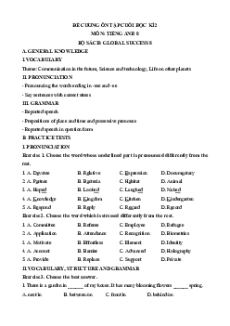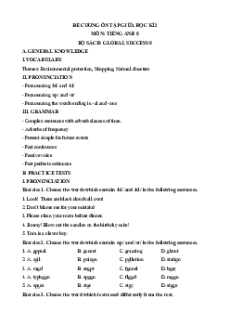Đề thi cuối kì 1 i-Learn Smart World 8 Đề 5
Listen to the conversation between Jessica and Rita. Circle the correct answers.
Question 1. What was the most useful thing Rita learned from Mr. Park’s presentation? A. making an escape plan B. keeping food and drinks C. boarding up a house D. keeping a lifebuoy
Question 2. What did Jessica think about the workshop when it was over? A. boring B. fun C. terrible D. informative
Question 3. What idea from the presentation did Jessica like? A. making an escape plan B. calling emergency services C. boarding up a house
D. stocking up on food and drinks
Question 4. What did Mr. Park advise people to do while waiting for the supplies? A. to stock up B. to board up C. to write an escape plan D. to wait for supplies
Question 5. What should people do if the flood was too high?
A. climb up a tree B. walk up a hill C. move upstairs D. climb up a ladder
Circle the word that has the underlined part pronounced differently from the others. Question 6. A. toes B. buses C. beaches D. oranges
Question 7. A. furniture B. burn C. surprise D. surface Question 8. A. nature B. city C. sports D. sometimes
Circle the word that has a stress pattern different from the others. Question 9. A. avoid B. select C. listen D. attract
Question 10. A. basketball B. competition C. shuttlecock D. badminton
Circle the best options (A, B, C, or D).
Question 11. We should reduce our use of water ________ we should recycle things more often. A. so B. and C. because D. in order that
Question 12. I like living in the country because there’s ________ of nature. A. a lot B. many C. much D. enough
Question 13. Come and take ________ in the 2026 Mid-Autumn Festival. A.piece B. place C. part D. past
Question 14. A big storm in the Pacific is known as a _________. A. avalanche B. typhoon C. tsunami D. tornado
Question 15. We should recycle so that we ________ land pollution. A. reduced B. can reduce
C. should reduce D. didn’t reduce
Question 16. You should seek shelter ________ a strong table or desk until the shaking stops. A. to B. in C. out D. under
Question 17. If they keep throwing trash into the river, many fish _________. A. will die B. die C. dies D. died
Question 18. Kate: ________ did the tsunami destroy? – Jack: The whole village. A. Where B. Which C. What D. Why
Question 19. I prefer ________ online because it is convenient. A. to shop B. shop C. shopping D. to shopping
Question 20. Making electricity often causes pollution. I think we should save energy.
A. That’s a good idea! How can we save it?
B. That’s a good idea! How do we make it?
C. That’s great! What do we need to make it?
D. That sounds great! Can we leave for it now?
Put the words in brackets in the correct forms.
Question 21. Life expectancy has gone down due to ________ disasters caused by air pollution. (DIE)
Question 22. Emergency ________ from the National Weather Service are very important
to local people during disasters. (ANNOUNCE)
Question 23. She listens to classical music for _________. (RELAX)
Question 24. Some people say that the country is more ________ for the people who are retired. (SUIT)
Question 25. We assisted them with the ________ of food and clothing. (PROVIDE)
Circle ONE mistake in each sentence.
Question 26. Andy: “How (A) many (B) did (C) it take to stop the fire (D)?” – Ben: “About 3 hours.”
Question 27. Do (A) you want to (B) play shuttlecock (C) on the school yard tomorrow on (D) around 5 p.m.?
Question 28. Traffic jams (A) are not a (B) problem in the (C) country because there
aren’t too much (D) vehicles.
Question 29. If there's an (A) earthquake, remember to get in (B) the desk to stay away (C) from fallen things (D).
Question 30. Stay on (A) a table to protect (B) yourself when (C) an earthquake happens (D).
Choose the word or phrase that is CLOSEST in meaning to the underlined part in each
of the following sentences.
Question 31. The baby is sleeping sound in her mother’s arms. A. deeply and peacefully B. easily to wake up C. sensibly D. safely
Question 32. The fumes from vehicles is a contributing factor to make people cough. A. noise B. fuel C. exhaust D. water
Choose the word or phrase that is OPPOSITE in meaning to the underlined part in
each of the following sentences.
Question 33. Several new botanical species have been killed in the last year because of water and soil pollution. A. mammals B. plants C. insects D. animals
Question 34. Pure water is often a fairly rare commodity that requires significant energy to produce. A. contaminated B. clean C. unadulterated D. flawless
Read the email from Chris to his friend, Luke. Choose the best word or phrases A, B,
C, or D for each numbered space. Hi Luke,
Did you watch that program about natural disasters last night? It was excellent! I was a
bit bored at the beginning because the first disaster was snow coming down a
mountainside. I’m not sure that (35) ________ are really disasters, but they are horrible for skiers.
After the first break, there was a sad story about a (36) ________ in a part of India. It
didn’t rain for nine months, and there was no water in any of the lakes or rivers. All the
food plants died, and people brought things into the area by truck every day.
Next, we had a story about a kind of storm. It turns very fast over water and sometimes
causes a lot of damage when it goes over land. It’s called a (37) _________.
There’s another program next week about other natural disasters, but this program ended
with some advice. The presenter said people need to be ready, but that is strange, because
he also said there is often no (38) ________ that a natural disaster will happen.
Next week, we will learn about the (39) ________ of natural disasters, which will be very
interesting. Do you want to come and watch it with me? Best wishes, Chris
Question 35. A. blizzards B. avalanches C. landslides D. earthquakes
Question 36. A. heat wave B. drought C. wildfire D. fire
Question 37. A. typhoon B. tsunami C. wave D. wind
Question 38. A. extinguisher B. kit C. plan D. warning
Question 39. A. expects B. informs C. causes D. supplies
Read the text and and decide if the statements are True (T) or False (F).
A flood is land covered by water that is not usually covered by water. This means
that any time a river, lake, or other body of water overflows its banks, it’s technically
Đề thi cuối kì 1 Tiếng Anh 8 ilearn smart world (Đề 5 kèm file nghe)
2.9 K
1.4 K lượt tải
MUA NGAY ĐỂ XEM TOÀN BỘ TÀI LIỆU
CÁCH MUA:
- B1: Gửi phí vào TK:
1133836868- CT TNHH DAU TU VA DV GD VIETJACK - Ngân hàng MB (QR) - B2: Nhắn tin tới Zalo VietJack Official ( nhấn vào đây ) để xác nhận thanh toán và tải tài liệu - giáo án
Liên hệ ngay Hotline hỗ trợ: 084 283 45 85
Đề thi được cập nhật liên tục trong gói này từ nay đến hết tháng 3/2024. Chúng tôi đảm bảo đủ số lượng đề đã cam kết hoặc có thể nhiều hơn, tất cả có BẢN WORD, LỜI GIẢI CHI TIẾT và tải về dễ dàng.
Để tải tài liệu gốc về máy bạn click vào nút Tải Xuống ở trên!
Thuộc bộ (mua theo bộ để tiết kiệm hơn):
- Tailieugiaovien.com.vn giới thiệu bộ đề thi cuối kì 1 kèm file nghe Tiếng anh 8 ilearn smart world mới nhất nhằm giúp Giáo viên có thêm tài liệu tham khảo ra đề thi Tiếng anh lớp 8.
- File word có lời giải chi tiết 100%.
- Mua trọn bộ sẽ tiết kiệm hơn tải lẻ 50%.
Đánh giá
4.6 / 5(2855 )5
4
3
2
1
Trọng Bình
Tài liệu hay
Giúp ích cho tôi rất nhiều
Duy Trần
Tài liệu chuẩn
Rất thích tài liệu bên VJ soạn (bám sát chương trình dạy)
TÀI LIỆU BỘ BÁN CHẠY MÔN Tiếng Anh
Xem thêmTÀI LIỆU BỘ BÁN CHẠY Lớp 8
Xem thêmTài liệu bộ mới nhất

Đề thi cuối kì 1 i-Learn Smart World 8
Đề 5
Listen to the conversation between Jessica and Rita. Circle the correct answers.
Question 1. What was the most useful thing Rita learned from Mr. Park’s presentation?
A. making an escape plan B. keeping food and drinks
C. boarding up a house D. keeping a lifebuoy
Question 2. What did Jessica think about the workshop when it was over?
A. boring B. fun C. terrible D. informative
Question 3. What idea from the presentation did Jessica like?
A. making an escape plan B. calling emergency services
C. boarding up a house D. stocking up on food and drinks
Question 4. What did Mr. Park advise people to do while waiting for the supplies?
A. to stock up B. to board up
C. to write an escape plan D. to wait for supplies
Question 5. What should people do if the flood was too high?
A. climb up a tree B. walk up a hill C. move upstairs D. climb up a ladder
Circle the word that has the underlined part pronounced differently from the others.
Question 6. A. toes B. buses C. beaches D. oranges
Question 7. A. furniture B. burn C. surprise D. surface
Question 8. A. nature B. city C. sports D. sometimes
Circle the word that has a stress pattern different from the others.
Question 9. A. avoid B. select C. listen D. attract
Question 10. A. basketball B. competition C. shuttlecock D. badminton
Circle the best options (A, B, C, or D).
Question 11. We should reduce our use of water ________ we should recycle things more
often.
A. so B. and C. because D. in order that
Question 12. I like living in the country because there’s ________ of nature.

A. a lot B. many C. much D. enough
Question 13. Come and take ________ in the 2026 Mid-Autumn Festival.
A.piece B. place C. part D. past
Question 14. A big storm in the Pacific is known as a _________.
A. avalanche B. typhoon C. tsunami D. tornado
Question 15. We should recycle so that we ________ land pollution.
A. reduced B. can reduce C. should reduce D. didn’t reduce
Question 16. You should seek shelter ________ a strong table or desk until the shaking
stops.
A. to B. in C. out D. under
Question 17. If they keep throwing trash into the river, many fish _________.
A. will die B. die C. dies D. died
Question 18. Kate: ________ did the tsunami destroy? – Jack: The whole village.
A. Where B. Which C. What D. Why
Question 19. I prefer ________ online because it is convenient.
A. to shop B. shop C. shopping D. to shopping
Question 20. Making electricity often causes pollution. I think we should save energy.
A. That’s a good idea! How can we save it?
B. That’s a good idea! How do we make it?
C. That’s great! What do we need to make it?
D. That sounds great! Can we leave for it now?
Put the words in brackets in the correct forms.
Question 21. Life expectancy has gone down due to ________ disasters caused by air
pollution. (DIE)
Question 22. Emergency ________ from the National Weather Service are very important
to local people during disasters. (ANNOUNCE)
Question 23. She listens to classical music for _________. (RELAX)

Question 24. Some people say that the country is more ________ for the people who are
retired. (SUIT)
Question 25. We assisted them with the ________ of food and clothing. (PROVIDE)
Circle ONE mistake in each sentence.
Question 26. Andy: “How (A) many (B) did (C) it take to stop the fire (D)?” – Ben:
“About 3 hours.”
Question 27. Do (A) you want to (B) play shuttlecock (C) on the school yard tomorrow
on (D) around 5 p.m.?
Question 28. Traffic jams (A) are not a (B) problem in the (C) country because there
aren’t too much (D) vehicles.
Question 29. If there's an (A) earthquake, remember to get in (B) the desk to stay away
(C) from fallen things (D).
Question 30. Stay on (A) a table to protect (B) yourself when (C) an earthquake happens
(D).
Choose the word or phrase that is CLOSEST in meaning to the underlined part in each
of the following sentences.
Question 31. The baby is sleeping sound in her mother’s arms.
A. deeply and peacefully B. easily to wake up
C. sensibly D. safely
Question 32. The fumes from vehicles is a contributing factor to make people cough.
A. noise B. fuel C. exhaust D. water
Choose the word or phrase that is OPPOSITE in meaning to the underlined part in
each of the following sentences.
Question 33. Several new botanical species have been killed in the last year because of
water and soil pollution.
A. mammals B. plants C. insects D. animals
Question 34. Pure water is often a fairly rare commodity that requires significant energy
to produce.

A. contaminated B. clean C. unadulterated D. flawless
Read the email from Chris to his friend, Luke. Choose the best word or phrases A, B,
C, or D for each numbered space.
Hi Luke,
Did you watch that program about natural disasters last night? It was excellent! I was a
bit bored at the beginning because the first disaster was snow coming down a
mountainside. I’m not sure that (35) ________ are really disasters, but they are horrible
for skiers.
After the first break, there was a sad story about a (36) ________ in a part of India. It
didn’t rain for nine months, and there was no water in any of the lakes or rivers. All the
food plants died, and people brought things into the area by truck every day.
Next, we had a story about a kind of storm. It turns very fast over water and sometimes
causes a lot of damage when it goes over land. It’s called a (37) _________.
There’s another program next week about other natural disasters, but this program ended
with some advice. The presenter said people need to be ready, but that is strange, because
he also said there is often no (38) ________ that a natural disaster will happen.
Next week, we will learn about the (39) ________ of natural disasters, which will be very
interesting. Do you want to come and watch it with me?
Best wishes,
Chris
Question 35. A. blizzards B. avalanches C. landslides D. earthquakes
Question 36. A. heat wave B. drought C. wildfire D. fire
Question 37. A. typhoon B. tsunami C. wave D. wind
Question 38. A. extinguisher B. kit C. plan D. warning
Question 39. A. expects B. informs C. causes D. supplies
Read the text and and decide if the statements are True (T) or False (F).
A flood is land covered by water that is not usually covered by water. This means
that any time a river, lake, or other body of water overflows its banks, it’s technically

flooding. However, most people think of the more catastrophic types of floods, as those
are the types that cause widespread damage and loss of life. Unless a flood causes some
kind of financial damage or loss of life to humans or livestock, it’s not considered a
significant flood.
Because so much of the damage inflicted by floods has long-lasting consequences,
floods are among the most catastrophic of natural disasters. Flood often results in loss of
life and cause emotional trauma for those who have gone through it. Even if people have
not been directly affected by the loss of life, losing property, houses, or land can cause
physiological damage. Especially if the people affected are unable to rebuild due to the
houses being too badly damaged, farm land being inundated with salt water, or lack of
resources to rebuild, many find the recovery to be more than just physical.
Question 40. A flood is land covered by water that is not usually covered by water.
Question 41. Unless a flood causes some kind of financial damage or loss of life to
humans or livestock, it’s not considered a significant flood.
Question 42. Flood is the most catastrophic of natural disasters.
Question 43. Floods often cause loss of life and cause emotional trauma.
Question 44. Floods affect not only human life but also destroy property.
Write the second sentence so that it has a similar meaning to the first one.
Question 45. People use so many cars and motorbikes. Air pollution gets worse. (IF)
→ ________________________________________________________________.
Question 46. The Hung King Temple Festival was a local festival. It has become a public
holiday in Vietnam since 2007. (HOWEVER)
→ ________________________________________________________________.
Question 47. The Amazon is on fire as a result of illegal forest clearing to make more
farms.
→ ________________________________________________________________?
Reorder the words to make full sentences.

Question 48. natural/ typhoons and floods/ the/ in/ most/ Are/ frequent/ Vietnam/
disasters/?
→ ________________________________________________________________?
Question 49. In/ children/ the city/ play/ the countryside/ freely/ than/ more/ in/ .
→ ________________________________________________________________.
Question 50. because/ the air/ People/ living/ fresh/ the villages/ enjoy/ is/ clean/ in/ and/.
→ ________________________________________________________________.
ĐÁP ÁN VÀ LỜI GIẢI:
Listen to a conversation between Mike and Lucy. Choose the best answers.
Question 1.
Hướng dẫn giải:
Đáp án đúng: A
Dịch: Điều bổ ích nhất mà Rita học được từ bài thuyết trình của thầy Park là gì?
A. lập kế hoạch thoát hiểm B. dự trữ đồ ăn và đồ uống
C. gia cố nhà D. mang theo phao cứu sinh
Thông tin:
Jessica: Yeah, me too. What is the most useful thing you learned from the presentation?
(Jessica: Ừ, tớ cũng vậy. Điều hữu ích nhất bạn học được từ bài thuyết trình là gì?)
Rita: Chà, tớ nghĩ đó là về việc lập kế hoạch thoát hiểm. Nó có thể cứu sống chúng ta nếu
thảm họa thiên nhiên xảy ra. (Chà, tớ nghĩ đó là về việc lập kế hoạch thoát hiểm. Nó có
thể cứu sống chúng ta nếu thảm họa thiên nhiên xảy ra.)
Question 2.
Hướng dẫn giải:
Đáp án đúng: D
Dịch: Jessica nghĩ gì về buổi workshop khi kết thúc?
A. nhàm chán B. thú vị C. khủng khiếp D. nhiều thông tin
Thông tin: Jessica: At first, I thought the presentation was not any fun, but I was wrong in
the end. Mr. Park gave us a lot of useful information. (Lúc đầu tớ nghĩ bài thuyết trình

không có gì thú vị nhưng cuối cùng tớ đã nhầm. Thầy Park đã cho chúng ta rất nhiều thông
tin hữu ích.)
Question 3.
Hướng dẫn giải:
Đáp án đúng: C
Dịch: Jessica thích ý tưởng nào trong bài thuyết trình?
A. lập kế hoạch thoát hiểm B. gọi cứu hộ
C. gia cố nhà D. dự trữ đồ ăn thức uống
Thông tin: Jessica: …I like the idea of boarding up a house to stop the wind from going
inside when there is a storm. (…Tớ thích ý tưởng gia cố nhà để ngăn gió lùa vào khi có
bão.)
Question 4.
Hướng dẫn giải:
Đáp án đúng: A
Dịch: Thầy Park khuyên mọi người làm gì trong thời gian chờ tiếp tế?
A. dự trữ B. gia cố
C. viết kế hoạch thoát hiểm D. chờ tiếp tế
Thông tin: Rita: Yeah. He also said we should keep food and drinks like instant noodles
or rainwater for emergencies while we wait for the supplies. (Ừ. Thầy cũng khuyên chúng
ta nên dự trữ đồ ăn, thức uống như mì ăn liền hay nước mưa để đề phòng trường hợp khẩn
cấp trong khi chờ tiếp tế.)
Question 5.
Hướng dẫn giải:
Đáp án đúng: B
Dịch: Nước lũ dâng cao người dân phải làm gì?
A. trèo lên cây B. đi lên đồi
C. di chuyển lên lầu D. leo lên thang

Thông tin: Jessica: He even advised us to walk up the hill for safety if the flood level was
too high. (Thầy ấy thậm chí còn khuyên chúng ta đi bộ lên đồi để đảm bảo an toàn nếu
mực nước lũ quá cao.)
Nội dung bài nghe:
Jessica: Did you enjoy Mr. Park's presentation on safety tips for natural disasters, Rita?
Rita: Yeah, Jessica. It was really helpful to me.
Jessica: Yeah, me too. What is the most useful thing you learned from the presentation?
Rita: Well, I think it was about making an escape plan. It could save our lives if a natural
disaster happened.
Jessica: You're right.
Rita: What about you, Jessica?
Jessica: At first, I thought the presentation was not any fun, but I was wrong in the end.
Mr. Park gave us a lot of useful information. I like the idea of boarding up a house to stop
the wind from going inside when there is a storm.
Rita: Yeah. He also said we should keep food and drinks like instant noodles or rainwater
for emergencies while we wait for the supplies.
Jessica: He even advised us to walk up the hill for safety if the flood level was too high.
Rita: Yeah. I also like the idea of keeping a lifebuoy if we live near a river or stream.
Jessica: Me, too.
Dịch bài nghe:
Jessica: Bạn có thích bài thuyết trình của thầy Park về những lời khuyên an toàn khi xảy
ra thiên tai không, Rita?
Rita: Có, Jessica. Nó thực sự hữu ích với tớ.
Jessica: Ừ, tớ cũng vậy. Điều hữu ích nhất bạn học được từ bài thuyết trình là gì?
Rita: Chà, tớ nghĩ đó là về việc lập kế hoạch thoát hiểm. Nó có thể cứu sống chúng ta nếu
thảm họa thiên nhiên xảy ra.
Jessica: Bạn nói đúng.
Rita: Còn bạn thì sao, Jessica?

Jessica: Lúc đầu tớ nghĩ bài thuyết trình không có gì thú vị nhưng cuối cùng tớ đã nhầm.
Thầy Park đã cho chúng ta rất nhiều thông tin hữu ích. Tớ thích ý tưởng gia cố nhà để
ngăn gió lùa vào khi có bão.
Rita: Ừ. Thầy cũng khuyên chúng ta nên dự trữ đồ ăn, thức uống như mì ăn liền hay nước
mưa để đề phòng trường hợp khẩn cấp trong khi chờ tiếp tế.
Jessica: Thầy ấy thậm chí còn khuyên chúng ta đi bộ lên đồi để đảm bảo an toàn nếu mực
nước lũ quá cao.
Rita: Ừ. Tớ cũng thích ý tưởng mang theo phao cứu sinh nếu chúng ta sống gần sông suối.
Circle the word that has the underlined part pronounced differently from the others.
Question 6.
Hướng dẫn giải:
Đáp án đúng: A
Đáp án A có phần gạch chân được phát âm là /z/, các đáp án còn lại có phần gạch chân
được phát âm là /iz/.
Question 7.
Hướng dẫn giải:
Đáp án đúng: C
Đáp án C có phần gạch chân được phát âm là /ə/, các đáp án còn lại có phần gạch chân
được phát âm là /ɜː/.
Question 8.
Hướng dẫn giải:
Đáp án đúng: A
Đáp án A có phần gạch chân được phát âm là /tʃ/, các đáp án còn lại có phần gạch chân
được phát âm là /t/.
Circle the word that has a stress pattern different from the others.
Question 9.
Hướng dẫn giải:
Đáp án đúng: C

Đáp án C có trọng âm rơi vào âm tiết thứ 1, các đáp án còn lại có trọng âm rơi vào âm tiết
thứ 2.
Question 10.
Hướng dẫn giải:
Đáp án đúng: B
Đáp án B có trọng âm rơi vào âm tiết thứ 3, các đáp án còn lại có trọng âm rơi vào âm tiết
thứ 1.
Circle the best options (A, B, C, or D).
Question 11.
Hướng dẫn giải:
Đáp án đúng: B
Liên từ “and” dùng để nối 2 mệnh đề có nghĩa tương đồng nhau.
so: vì vậy mà
because: bởi vì
in order that + clause: để…
Dịch: Chúng ta nên giảm việc sử dụng nước và chúng ta nên tái chế mọi thứ thường xuyên
hơn.
Question 12.
Hướng dẫn giải:
Đáp án đúng: A
a lot of + N đếm được/ không đếm được: nhiều
many of + N số nhiều: nhiều trong số
much of + N không đếm được: nhiều trong số
enough + N: đủ
Dịch: Tôi thích sống ở nông thôn vì có nhiều thiên nhiên.
Question 13.
Hướng dẫn giải:
Đáp án đúng: C

take part in: tham gia vào
Dịch: Hãy đến tham gia lễ hội Trung thu năm 2026.
Question 14.
Hướng dẫn giải:
Đáp án đúng: B
typhoon (n): bão nhiệt đới
avalanche (n): tuyết lở
tsunami (n): sóng thần
tornado (n): lốc xoáy
Dịch: Một cơn bão lớn ở Thái Bình Dương được gọi là bão nhiệt đới.
Question 15.
Hướng dẫn giải:
Đáp án đúng: B
can + V-inf: có thể làm gì
should + V-inf: nên làm gì
Dịch: Chúng ta nên tái chế để có thể làm giảm ô nhiễm đất.
Question 16.
Hướng dẫn giải:
Đáp án đúng: D
under (prep): bên dưới
to (prep): tới
in (prep): bên trong
out (prep): bên ngoài
Dịch: Bạn nên tìm nơi trú ẩn dưới một cái bàn chắc chắn cho đến khi hết rung lắc.
Question 17.
Hướng dẫn giải:
Đáp án đúng: A
Câu điều kiện loại 1 (có thật ở hiện tại):

If + S + V (HTĐ) + O, S + will/can + V-inf + O.
Dịch: Nếu họ cứ vứt rác xuống sông thì nhiều loài cá sẽ chết.
Question 18.
Hướng dẫn giải:
Đáp án đúng: C
What: Cái gì
Where: Ở đâu, nơi nào
Which: Cái nào
Why: Tại sao
Dịch: Kate: Cơn sóng thần đã tàn phá cái gì? – Jack: Cả ngôi làng.
Question 19.
Hướng dẫn giải:
Đáp án đúng: A
prefer to do sth: thích làm gì hơn
Dịch: Tôi thích mua sắm trực tuyến hơn vì nó tiện lợi.
Question 20.
Hướng dẫn giải:
Đáp án đúng: A
A. Đó là 1 ý tưởng hay đấy! Chúng ta có thể tiết kiệm năng lượng bằng cách nào?
B. Đó là 1 ý tưởng hay đấy! Chúng ta có thể sản xuất ra nó bằng cách nào?
C. Điều đó thật tuyệt! Chúng ta cần gì để sản xuất ra nó?
D. Điều đó nghe có vẻ tuyệt đấy! Bây giờ chúng ta có thể để dành nó được không?
Dịch: Sản xuất điện thường gây ô nhiễm. Tôi nghĩ chúng ta nên tiết kiệm năng lượng.
Put the words in brackets in the correct forms.
Question 21.
Hướng dẫn giải:
Đáp án đúng: deadly
Ta cần 1 tính từ đứng trước danh từ “disasters” để bổ sung nghĩa cho nó.

die (v): chết → deadly (adj): chết người, chết chóc
Dịch: Tuổi thọ đã giảm do các thảm họa chết chóc gây ra bởi ô nhiễm không khí.
Question 22.
Hướng dẫn giải:
Đáp án đúng: announcements
Ta cần 1 danh từ để tạo thành 1 danh từ ghép. Động từ “are” chia số nhiều nên chủ ngữ
phải ở dạng số nhiều.
announce (v): thông báo
emergency announcements: các thông báo khẩn
Dịch: Các thông báo khẩn của Cơ quan Khí tượng Quốc gia có ý nghĩa rất quan trọng đối
với người dân địa phương khi có thiên tai.
Question 23.
Hướng dẫn giải:
Đáp án đúng: relaxation
Sau giới từ “for” cần 1 danh từ.
relax (v): thư giãn → relaxation (n): sự thư giãn
Dịch: Cô ấy nghe nhạc cổ điển để thư giãn.
Question 24.
Hướng dẫn giải:
Đáp án đúng: suitable
Sau “tobe” cần 1 tính từ.
suit (v): phù hợp → suitable (adj): phù hợp
Dịch: Một số người nói rằng nông thôn phù hợp với những người đã nghỉ hưu hơn.
Question 25.
Hướng dẫn giải:
Đáp án đúng: providing
Sau mạo từ “the” cần 1 danh từ.
provide (v): cung cấp → providing (n): nguồn cung cấp

Dịch: Chúng tôi đã hỗ trợ họ bằng cách cung cấp thực phẩm và quần áo.
Circle ONE mistake in each sentence.
Question 26.
Hướng dẫn giải:
Đáp án đúng: B
How many + N đếm được số nhiều: Có bao nhiêu
How long: Bao lâu
Sửa thành: How long
Dịch: Andy: “Mất bao lâu để dập tắt đám cháy?” – Ben: “Khoảng 3 tiếng.”
Question 27.
Hướng dẫn giải:
Đáp án đúng: D
at + giờ cụ thể
Sửa thành: at
Dịch: Bạn có muốn chơi cầu lông trên sân trường ngày mai vào khoảng 5 giờ chiều không?
Question 28.
Hướng dẫn giải:
Đáp án đúng: D
“vehicles” là danh từ đếm được nên không đi với “too much”.
Sửa thành: many
Dịch: Ùn tắc giao thông không phải là vấn đề ở vùng nông thôn vì không có quá nhiều
phương tiện đi lại.
Question 29.
Hướng dẫn giải:
Đáp án đúng: B
in (prep): bên trong
under (prep): bên dưới
Sửa thành: under

Dịch: Nếu có động đất, hãy nhớ chui xuống gầm bàn để tránh các vật rơi xuống.
Question 30.
Hướng dẫn giải:
Đáp án đúng: A
on (prep): bên trên (bề mặt 1 vật khác)
under (prep): bên dưới
Sửa thành: under
Dịch: Hãy ở dưới gầm bàn để bảo vệ bản thân khi xảy ra động đất.
Choose the word or phrase that is CLOSEST in meaning to the underlined part in each
of the following sentences.
Question 31.
Hướng dẫn giải:
Đáp án đúng: A
sound (adv): ngon lành = deeply and peacefully: sâu và yên bình
easily to wake up: dễ thức giấc
sensibly (adv): một cách hợp lí
safely (adv): một cách an toàn
Dịch: Em bé đang ngủ ngon lành trong vòng tay mẹ.
Question 32.
Hướng dẫn giải:
Đáp án đúng: C
fumes (n): khói = exhaust (n): khi thải
noise (n): tiếng ồn
fuel (n): nhiên liệu
water (n): nước
Dịch: Khói từ các phương tiện giao thông là tác nhân gây ho.
Choose the word or phrase that is OPPOSITE in meaning to the underlined part in
each of the following sentences.
Question 33.
Hướng dẫn giải:
Đáp án đúng: D
botanical species (n): các loài thực vật >< animals (n): các loài động vật
mammals (n): động vật có vú
plants (n): thực vật
insects (n): côn trùng
Dịch: Một số loài thực vật mới đã bị tiêu diệt trong năm qua do ô nhiễm nước và đất.
Question 34.
Hướng dẫn giải:
Đáp án đúng: A
pure (adj): tinh khiết >< contaminated (adj): bị ô nhiễm
clean (adj): sạch
unadulterated (adj): không bị pha trộn
flawless (adj): hoàn hảo
Dịch: Nước tinh khiết thường là mặt hàng khá hiếm, cần năng lượng đáng kể để sản xuất.
Read the email from Chris to his friend, Luke. Choose the best word or phrases A, B,
C, or D for each numbered space.
Question 35.
Hướng dẫn giải:
Đáp án đúng: B
avalanches (n): tuyết lở
blizzards (n): bão tuyết
landslides (n): lở đất
earthquakes (n): động đất
Dịch: Bạn có xem chương trình về thiên tai tối qua không? Nó thật tuyệt vời! Lúc đầu tôi
thấy hơi chán vì thảm họa đầu tiên là tuyết rơi xuống sườn núi. Tôi không chắc tuyết lở
có thực sự là thảm họa hay không nhưng chúng thật kinh khủng đối với những người trượt
tuyết.
Question 36.
Hướng dẫn giải:
Đáp án đúng: B
drought (n): hạn hán
heat wave (n): sóng nhiệt
wildfire (n): cháy rừng
fire (n): đám cháy
Dịch: Sau khi giải lao, có một câu chuyện buồn về hạn hán ở một vùng đất Ấn Độ. Trời
không mưa trong chín tháng và sông hồ không có chút nước nào cả. Tất cả các cây hoa
màu đều chết và người dân chở đồ vào khu vực này hàng ngày bằng xe tải.
Question 37.
Hướng dẫn giải:
Đáp án đúng: A
typhoon (n): bão nhiệt đới
tsunami (n): sóng thần
wave (n): sóng
wind (n): gió
Dịch: Tiếp theo, chúng ta có câu chuyện về một loại bão. Nó trở nên rất nhanh trên mặt
nước và đôi khi gây ra nhiều thiệt hại khi đi trên đất liền. Nó được gọi là bão nhiệt đới.
Question 38.
Hướng dẫn giải:
Đáp án đúng: D
warning (n): cảnh báo
extinguisher (n): bình chữa cháy
kit (n): bộ đồ nghề, trang bị cần thiết cho 1 hoạt động
plan (n): phương án
Dịch: Người dẫn chương trình cho biết mọi người cần phải sẵn sàng, nhưng thật lạ, vì ông
cũng cho biết thường không có cảnh báo trước về việc thiên tai sẽ xảy ra.
Question 39.
Hướng dẫn giải:
Đáp án đúng: C
cause (n): nguyên nhân
expect (v): mong chờ, trông đợi
inform (v): thông báo
supply (n): nguồn cung; (v): cung cấp
Dịch: Tuần tới chúng ta sẽ tìm hiểu về nguyên nhân gây ra thiên tai, sẽ rất thú vị. Bạn có
muốn đến và xem nó với tôi không?
Dịch bài đọc:
Chào Luke,
Bạn có xem chương trình về thiên tai tối qua không? Nó thật tuyệt vời! Lúc đầu tôi thấy
hơi chán vì thảm họa đầu tiên là tuyết rơi xuống sườn núi. Tôi không chắc tuyết lở có thực
sự là thảm họa hay không nhưng chúng thật kinh khủng đối với những người trượt tuyết.
Sau khi giải lao, có một câu chuyện buồn về hạn hán ở một vùng đất Ấn Độ. Trời không
mưa trong chín tháng và sông hồ không có chút nước nào cả. Tất cả các cây hoa màu đều
chết và người dân chở đồ vào khu vực này hàng ngày bằng xe tải.
Tiếp theo, chúng ta có câu chuyện về một loại bão. Nó trở nên rất nhanh trên mặt nước và
đôi khi gây ra nhiều thiệt hại khi đi trên đất liền. Nó được gọi là bão nhiệt đới.
Có một chương trình khác vào tuần tới về các thảm họa thiên nhiên khác, nhưng chương
trình này kết thúc với một số lời khuyên. Người dẫn chương trình cho biết mọi người cần
phải sẵn sàng, nhưng thật lạ, vì ông cũng cho biết thường không có cảnh báo trước về việc
thiên tai sẽ xảy ra.
Tuần tới chúng ta sẽ tìm hiểu về nguyên nhân gây ra thiên tai, sẽ rất thú vị. Bạn có muốn
đến và xem nó với tôi không?
Chúc bạn những điều tốt đẹp nhất,
Chris
Read the text and and decide if the statements are True (T) or False (F).
Question 40.
Hướng dẫn giải:
Đáp án đúng: T
Thông tin: A flood is land covered by water that is not usually covered by water. This
means that any time a river, lake, or other body of water overflows its banks, it’s
technically flooding. (Ngập lụt là vùng đất bị ngập nước và thường không như vậy. Điều
này có nghĩa là bất cứ khi nào sông, hồ hoặc các vùng nước khác tràn bờ thì về mặt kỹ
thuật đó là ngập lụt.)
Dịch: Lũ là vùng đất bị ngập nước mà thông thường không như vậy.
Question 41.
Hướng dẫn giải:
Đáp án đúng: T
Thông tin: However, most people think of the more catastrophic types of floods, as those
are the types that cause widespread damage and loss of life. Unless a flood causes some
kind of financial damage or loss of life to humans or livestock, it’s not considered a
significant flood. (Tuy nhiên, hầu hết mọi người đều nghĩ đến những loại lũ lụt thảm khốc
hơn, vì đó là những loại gây thiệt hại trên diện rộng và gây thiệt hại về tính mạng. Trừ khi
lũ lụt gây ra một số thiệt hại về tài chính hoặc thiệt hại về người và vật nuôi, nếu không
nó không được coi là một trận lũ lụt lớn.)
Dịch: Trừ khi lũ lụt gây ra một số thiệt hại về tài chính hoặc thiệt hại về người và vật nuôi,
nếu không thì không được coi là lũ lớn.
Question 42.
Hướng dẫn giải:
Đáp án đúng: F
Thông tin: Because so much of the damage inflicted by floods has long-lasting
consequences, floods are among the most catastrophic of natural disasters. (Bởi vì rất
nhiều thiệt hại do lũ lụt gây ra có hậu quả lâu dài nên lũ lụt là một trong những thảm họa
thiên nhiên thảm khốc nhất.)
Dịch: Lũ lụt là thảm họa thiên nhiên thảm khốc nhất.
Question 43.
Hướng dẫn giải:
Đáp án đúng: T
Thông tin: Flood often results in loss of life and cause emotional trauma for those who
have gone through it. (Lũ lụt thường gây thiệt hại về người và gây tổn thương tinh thần
cho những người đã trải qua nó.)
Dịch: Lũ lụt thường gây thiệt hại về người và gây tổn thương tinh thần.
Question 44.
Hướng dẫn giải:
Đáp án đúng: T
Thông tin: Flood often results in loss of life and cause emotional trauma for those who
have gone through it. Even if people have not been directly affected by the loss of life,
losing property, houses, or land can cause physiological damage. (Lũ lụt thường gây thiệt
hại về người và gây tổn thương tinh thần cho những người đã trải qua nó. Ngay cả khi con
người không bị ảnh hưởng trực tiếp bởi sự mất mát về tính mạng thì việc mất tài sản, nhà
cửa, đất đai cũng có thể gây ra những tổn hại về mặt sinh lý.)
Dịch: Lũ lụt không chỉ ảnh hưởng đến tính mạng con người mà còn phá hoại tài sản.
Dịch bài đọc:
Ngập lụt là vùng đất bị ngập nước và thường không như vậy. Điều này có nghĩa là
bất cứ khi nào sông, hồ hoặc các vùng nước khác tràn bờ thì về mặt kỹ thuật đó là ngập
lụt. Tuy nhiên, hầu hết mọi người đều nghĩ đến những loại lũ lụt thảm khốc hơn, vì đó là
những loại gây thiệt hại trên diện rộng và gây thiệt hại về tính mạng. Trừ khi lũ lụt gây ra
một số thiệt hại về tài chính hoặc thiệt hại về người và vật nuôi, nếu không nó không được
coi là một trận lũ lụt lớn.

Bởi vì rất nhiều thiệt hại do lũ lụt gây ra có hậu quả lâu dài nên lũ lụt là một trong
những thảm họa thiên nhiên thảm khốc nhất. Lũ lụt thường gây thiệt hại về người và gây
tổn thương tinh thần cho những người đã trải qua nó. Ngay cả khi con người không bị ảnh
hưởng trực tiếp bởi sự mất mát về tính mạng thì việc mất tài sản, nhà cửa, đất đai cũng có
thể gây ra những tổn hại về mặt sinh lý. Đặc biệt nếu những người bị ảnh hưởng không
thể xây dựng lại do nhà cửa bị hư hại quá nặng, đất nông nghiệp bị nhiễm mặn hoặc thiếu
nguồn lực để xây dựng lại, nhiều người nhận thấy việc phục hồi không chỉ mang tính vật
chất.
Write the second sentence so that it has a similar meaning to the first one.
Question 45.
Hướng dẫn giải:
Đáp án đúng: If people didn’t use so many cars and motorbikes, air pollution
wouldn’t get worse.
Câu điều kiện loại 2 (không có thật ở hiện tại):
If + S + V (QKĐ) + O, S + would/ could/ should + V-inf + O.
Dịch: Mọi người sử dụng quá nhiều xe hơi và xe máy. Ô nhiễm không khí trở nên tồi tệ
hơn. = Nếu mọi người không sử dụng quá nhiều xe hơi và xe máy, ô nhiễm không khí sẽ
không trở nên tồi tệ hơn.
Question 46.
Hướng dẫn giải:
Đáp án đúng: The Hung King Temple Festival was a local festival. However, it has
become a public holiday in Vietnam since 2007.
clause; however, clause = clause. However, clause: Tuy nhiên
Dịch: Lễ hội Đền Hùng là một lễ hội địa phương. Nó đã trở thành ngày nghỉ lễ ở Việt
Nam kể từ năm 2007. = Lễ hội Đền Hùng là một lễ hội địa phương. Tuy nhiên, nó đã trở
thành ngày nghỉ lễ ở Việt Nam kể từ năm 2007.
Question 47.
Hướng dẫn giải:

Đáp án đúng: Why is the Amazon on fire?
as a result of: là kết quả của → nói về lí do
Why: Tại sao
Dịch: Rừng Amazon cháy do nạn phá rừng trái phép để làm trang trại. = Tại sao rừng
Amazon lại cháy?
Reorder the words to make full sentences.
Question 48.
Hướng dẫn giải:
Đáp án đúng: Are typhoons and floods the most frequent natural disasters in
Vietnam?
So sánh nhất với tính từ dài: S + be + the most + adj + (N).
Dịch: Bão và lũ lụt có phải là những thiên tai hay xảy ra nhất ở Việt Nam không?
Question 49.
Hướng dẫn giải:
Đáp án đúng: In the countryside children play more freely than in the city.
So sánh hơn với trạng từ dài: S + V + more + adv + than + O.
Dịch: Ở nông thôn trẻ con chơi tự do hơn ở thành phố.
Question 50.
Hướng dẫn giải:
Đáp án đúng: People enjoy living in the villages because the air is fresh and clean.
enjoy doing sth: thích làm gì
Dịch: Mọi người thích sống ở các ngôi làng vì không khí trong lành và sạch sẽ.
